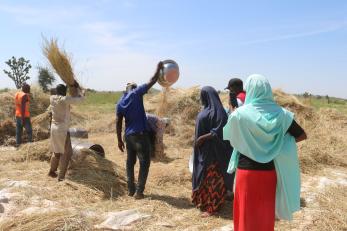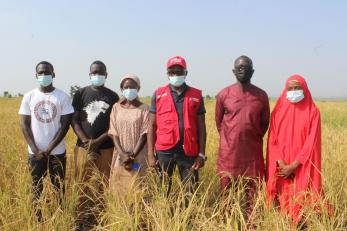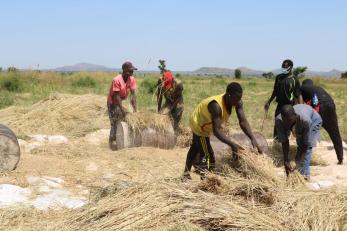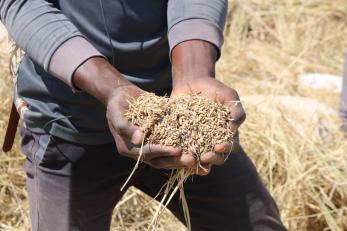Building resilient young farmers through partnership with the private sector

Unemployment among Nigeria youths
Muhammed Adamu Junior, a graduate of Biochemistry, is one of the 43% young Nigerians, aged 15-34 years, who are unemployed. Before becoming a participant of the Feed the Future Nigeria Rural Resilience Activity, Muhammed would collect and sell farm inputs donated by development programs while operating the veterinary store which he set up in Biu, Borno State, after an unsuccessful search for a job.
Fatima Dahiru (member), Adams Isa (Secretary-General), and Sindime Ibrahim (treasurer) are not different from Muhammed; they are four of the 30 members of the Biu Youth Agripreneurship Cooperative Society, who were onboarded by Intrio Synergy Limited (ISL), a partner of the Rural Resilience Activity on the Agripreneurship Initiative.
Like Muhammed, they were also unemployed. Fatima, an NCE holder from the College of Education in Waka-Biu sells wrappers, shoes, and other household items. Adams Isa, who holds a Diploma in Business Administration and Management could not put his small business on a prosperous path owing to lack of capital, and Sindime Ibrahim, who graduated in 2015 with NCE certificate is a private school teacher in Biu.
According to the Labour Force Unemployment and Underemployment Report released by the Nigeria Bureau of Statistics for Q4, 2020, the unemployment rate in Nigeria rose from 27.1% in Q2, 2020 to 33.3% in Q4, 2020. The unemployment rate among young people (15-34years) was the highest, rising from 34.9% to 42.5% in Q4.
Commercial agriculturists raised among Biu youths
In the second quarter of 2021, the Rural Resilience Activity, through its Agripreneurship initiative partnered with ISL to onboard 600 young agripreneurs in Borno, Adamawa, Yobe and Gombe states to build the capacity of young agripreneurs to become commercially focused. Having onboarded the Agripreneurs, ISL then acquired 33 hectares of land in Biu, Borno State to demonstrate commercial farming to 30 young agripreneurs who were encouraged to form a cooperative, whose chairman is Muhammed Adamu Junior.

“We started with almost 50 members, but we have been screening along the way based on participation. We dropped the people who didn’t take the farm work seriously. We are now left with 30 people (15 males and 15 females) that are serious,” said Muhammed.
ISL, in partnership with the Feed the Future Nigeria Rural Resilience Activity onboarded the cooperative members in April 2021, trained them on Good Agronomic Practices (GAP), safer use of agrochemicals and post-harvest handling techniques, and provided the needed agric-inputs throughout the life cycle of the rice, maize and cowpea crops.
Explaining the journey from cultivation to harvesting, Muhammed said:
“We rented the farm, cleared it, and tilled the farm. After tilling, we planted for almost four days. Then we applied herbicides the first time and after four months for post emergence. We applied NPK 20:10:10 fertilizer and came for hand pulling of weeds. ISL gave us everything on credit.”
Meanwhile, the cooperative members also benefitted from the USAID funded COVID‑19 Mitigation Response which is being implemented by the Rural Resilience Activity. The unconditional cash transfer is helping the participants to diversify their investment, making it possible for the young farmers to reinvest profits from the rice farm into expanding their farm size. The Biu Youth Agripreneurship Cooperative Society members contributed N40,000 from the cash transfers received from the COVID‑19 response to buy a tricycle which conveys them to the farm and generates extra income for the group.
Harvesting in a climate change impacted season
The support provided to the cooperative members is a motivation for participating in the agripreneurship program, even in the face of the sudden breakage in rainfall. This motivation is leading the cooperative members to venture into dry season farming on another farm where irrigation farming is possible. The rice section of the farm yielded 86 bags of 85kg of rice, which will be sold at a profitable price, usually determined by the market.
ISL is also working to ensure that the rice paddy is processed into packaged rice bags (value addition). Young entrepreneurs are often not motivated to venture into agriculture because of lack of access to land, lack of credit to buy inputs, the high cost of acquiring mechanization services, and the high risks involved in farming. These fears have been taken away by ISL, a private company that can provide succor to farmers during trying terms. There is no doubt that the young people in Nigeria require this kind of support to go into commercial agriculture.

“Most of the youth took agriculture as just farming but along the way, after some workshops, and training, we now understand that agriculture is not just farming but activities along the value chain, from cultivation, production, processing, and the rest. Initially, I didn’t like farming, I picked interest in farming after being enlightened,” said Muhammed.

About the Feed the Future Rural Resilience Activity
The Feed the Future Nigeria Rural Resilience Activity is a five-year Activity funded by the United States Agency for International Development (USAID) as part of ‘Feed the Future, the U.S. Government’s global hunger, and food security initiative.’ The Activity is being implemented by Mercy Corps, with support from IFDC and Save the Children, across the states of Adamawa, Borno, Gombe, and Yobe in Northeast Nigeria; and has the goal of facilitating economic recovery and growth in vulnerable, conflict-affected areas. Through evidence-based interventions, the Activity will strengthen resilience capacities by using market-led approaches and sustainably move over 500,000 households out of chronic vulnerability and poverty.